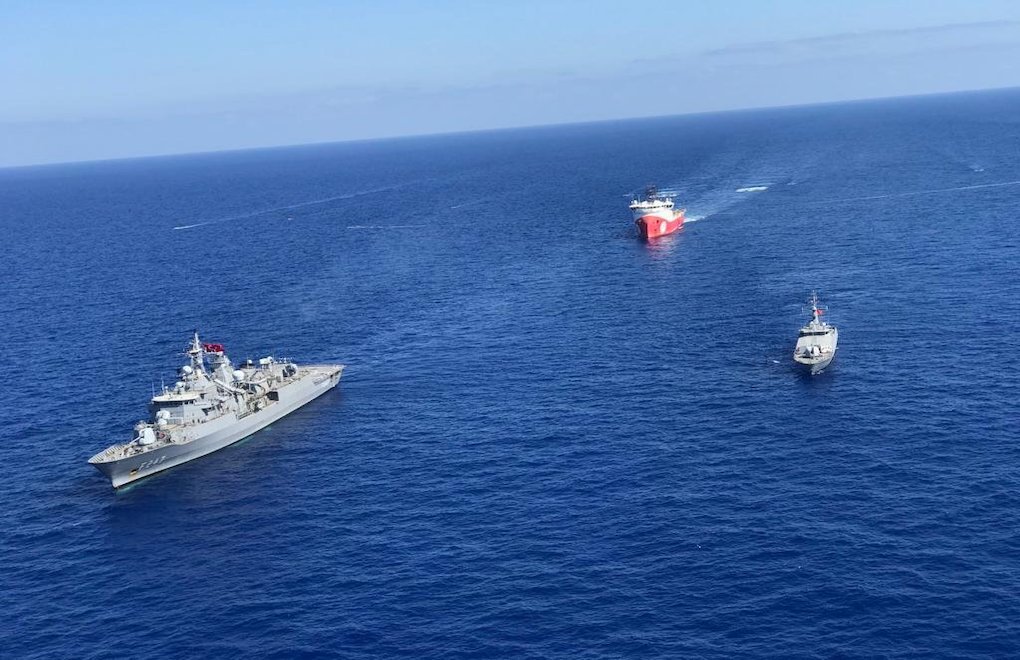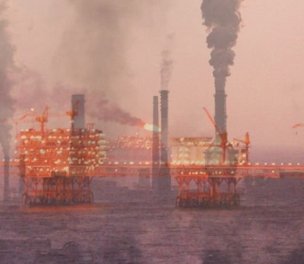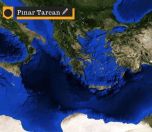* Photo: Anadolu Agency (AA) - Archive
Click to read the article in Turkish
Joining the "Don't Dig Campaign," 68 ecology organizations from Turkey, Greece and Cyprus held an online press conference.
Since September, the constituents of the campaign have been raising their demand "Don't Dig!" the fossil fuels for climate justice and for peace.
On January 26, which marked the anniversary of the Kardak/Imia crisis between Turkey and Greece, the national coordinations made a joint statement for peace and climate justice for all peoples of the region.
With this conference, which took place right after the 61st round of exploratory talks between Turkey and Greece after five years, the members of the "Don't Dig" campaign shared their common attitude about nationalism, destructive capitalist mining, climate crisis, war and regional politics.
'We are in a global ecological collapse'
Attending the conference from Turkey, Onur Yılmaz said:
"The world was perhaps  never a good place for people who were oppressed and forced to live under exploitation, but the crises one after another caused by the global capitalist system, which for quite a while now seemed to be racing to take our lives, never stopped.
never a good place for people who were oppressed and forced to live under exploitation, but the crises one after another caused by the global capitalist system, which for quite a while now seemed to be racing to take our lives, never stopped.
"Perhaps the most acute and decisive of all these economic, political, ideological, social deep crises, whose causes and consequences are intertwined, is the global ecological collapse.
"The one that is also the main cause of the current coronavirus pandemic, which has radically changed our daily life practices."
Noting that "they, as all life advocates who do not turn a blind eye to the consequences of this destruction, struggle to oppose all kinds of projects of states and corporations", Yılmaz briefly added:
"And this time, we untied our voices against the fossil gas in the Black Sea, which the Turkish state announced as 'a miracle' last August, the fossil fuel exploration activities of all countries and the ongoing pipeline project EastMed with the campaign we announced on September 25th: For climate justice and for peace, we raise our demand "Don't Dig!" the fossil fuels.
'No country borders in nature'
"25 years ago today, the peoples of Turkey and Greece on both sides of Aegean and the two peoples living in Cyprus, had tried to be confronted with yet another military tension so-called the Kardak/Imia crisis.
"However, neither that day nor at any time will be able to succeed, those racists and warmongers who try to make people hostile to each other. Our destinies are common as people living in the same geography.
"There are no country borders in nature, no exclusive economic zones. The soon-to-be-extinct species, the destroyed sea floor, the warming air, the polluted water, the soils that now yield less crops require an international struggle against these limitless ecocide projects.
'Resources never used for common welfare'
"Until now, the economic resources obtained by producing fossil fuels have never been used for the common welfare of the people in any country, it has filled the pockets of a handful of capitalists.
"This is also the case with gas and oil in the Mediterranean and Black Sea. Those who condemn us to unemployment and hunger by putting our countries into deep economic bottlenecks are those who carry out a war policy over gas and oil. That is why we make our call to all the people we invite to fight with us. Come, all together for peace, for climate justice, let us impose our demand "Don't Dig!" on them."
'The lie of "national interests"'
Emmanuela Terzopoulou from  Greece also said, "We are here to prevent a crime that is attempted in Eastern Mediterranean" and briefly added:
Greece also said, "We are here to prevent a crime that is attempted in Eastern Mediterranean" and briefly added:
"Whether our governments dispatch war frigates to the Mediterranean or they sit at the negotiating table, one thing is certain: Their competition for control of oil and gas reserves in the eastern Mediterranean remains a dangerous threat to peace and the environment.
"They are trying to convince us that the exploitation of known or unknown hydrocarbon reserves will bring prosperity to the peoples of the Mediterranean that the exploitation of hydrocarbon reserves is in the 'national' interest of each country.
"They are lying! The oil routes have not brought prosperity to the peoples of any oil-producing country. On the contrary, they have led to serious environmental damages, corruption and authoritarian regimes.
"Mediterranean peoples have nothing to gain from hydrocarbon extraction. Our interest is in a peaceful coexistence in a clean planet, in the protection of the environment, in the respect of human's as well as every living creature's rights, in the solidarity and breaking down of the nationalist walls that they try to build in order to divide us, in the defense of peace.
"The last 6 years have been recorded as the hottest in history. The consequences of exploiting nature for profit are:
"the rising global temperature and melting ice, the rising sea level and threat of coastal areas, the risk of releasing new - trapped in the ice - viruses, the desertification, the floods and fires, the disappearance of forests and ecosystems, the biodiversity loss, the air and water pollution together with development of new diseases, the climate migration.
"It is true that there are ones who will prosper from the exploitation of the reserves, including the multinational oil companies. The neoliberal capitalist model does not let any doubt that there will not be the peoples but the multinational oil corporations, the warfare industry and the individual interests served by the large powers as well as the smaller regional powers.
"It is them who see people and nature as a source of profit whether gained a cold-war atmosphere or by actual military interventions."
'No environmental benefits of natural gas'
Myrto Skouroupathi from Cyprus also said:
"Since Cyprus is an  energy-isolated island, fossil gas is theoretically presented as a way to break our dependence on the more polluting heavy oil imports and thus reduce our emissions at the same time. In theory, it is more polluting because governments are very easily choosing to calculate fossil gas emissions only during combustion. In fact, more than 5 percent of the gas may leak during extraction and transportation.
energy-isolated island, fossil gas is theoretically presented as a way to break our dependence on the more polluting heavy oil imports and thus reduce our emissions at the same time. In theory, it is more polluting because governments are very easily choosing to calculate fossil gas emissions only during combustion. In fact, more than 5 percent of the gas may leak during extraction and transportation.
Leaking methane is of course a much more powerful greenhouse gas than carbon dioxide. Therefore, natural gas does not provide any environmental benefits throughout its life cycle.
"In addition to climate change, the extraction of fossil gas in Cyprus puts the natural environment in great danger. The main landing plots are located in the same area with the Eratosthenis sea mountain. This is the Fishing Restricted Area and is a priority place for the Mediterranean Protected Areas of Special Importance (SPAMI) list.
'Similar to racist environmental practices'
"It will be important to note that all land infrastructure for fossil gas will already be built in the environmentally-laden Vasilikos area.
"The energy center will be built next to Mari, a historically Turkish Cypriot village inhabited by displaced Greek Cypriots today. This decision is very similar to racist environmental practices.
"Finally, the livelihoods of the island's thousands of residents who are dependent on tourism and fishing are constantly threatened by a potential accident, which could also irreparably damage the entire marine ecosystem of the Mediterranean.
"Obviously, the negative effects of the extraction of hydrocarbons outweigh the potential benefits to the environment and quality of life of all residents on the island. At the same time, the conflicting interests of the ruling elites in the region are an issue that sows conflict and anger.
"This is why hydrocarbon removal and the war against Cyprus, Turkey and Greece have launched this campaign together."
'Each activity driving us to military tension'
Lastly, Murat Kanatlı from Cyprus took the floor and said:
"Beginning with the  tender process for exploration permits in parcels, the military tension between the parties began to increase.
tender process for exploration permits in parcels, the military tension between the parties began to increase.
"Turkey has upgraded its military presence in the northern part of the island, has sent drones and UAVs, and has transferred warships to the region.
"It is anyway difficult to guess how fragile the situation is, as there is no direct ceasefire agreement between the parties on the island.
"The tension on the island has reached such a serious level that the Greek Cypriots officers who were called for reserve service in the summer of 2020 were also notified with documents that they could be called to arms at any time. The possibility for war on the island has also risen to maximum level.
"Every new natural gas exploration activity is driving us towards greater military tension. This is followed by militarist propaganda and naturally an increase in nationalism. Hydrocarbon activities in the Eastern Mediterranean have brought the island to the brink of war and continue to distance the communities living on the island from each other by preparing the ground for the rise of nationalism.
'Not only about the island'
"The issue is not only about the island. Some time ago, Israel, Egypt, Cyprus and Greece with the support of other EU countries, formed a military bloc, with the excuse of the EastMed Eastern Mediterranean Pipeline.
"Later, this partnership turned into the Eastern Mediterranean Gas Forum. It can easily be said that such a structure's military activities will further disrupt the unstable situation of the region.
"The militarization of the Eastern Mediterranean will not bring peace to the region. For this reason, natural gas explorations should be opposed to, in order to have regional peace and demilitarization." (TP/SD)






-132.jpg)
